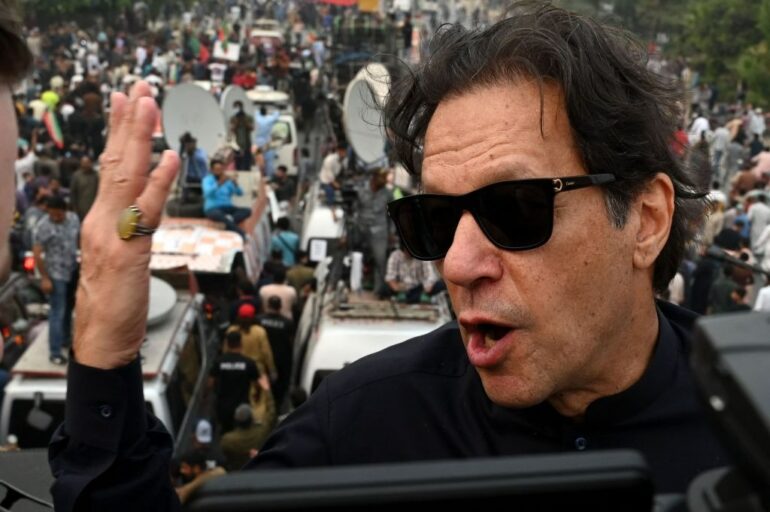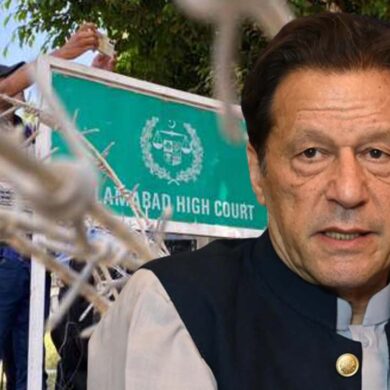Pakistan Tehreek-e-Insaf (PTI) Chairman Imran Khan on Saturday warned of another round of protest if the stakeholders failed to hold the elections within 90-days of the dissolution of provincial assemblies in Punjab and Khyber Pakhtunkhwa.
The Punjab Assembly was dissolved by then chief minister Chaudhry Parvez Elahi in January on the instructions of PTI Chairman Imran Khan. Imran had also ordered the dissolution of the K-P Assembly, which was also dissolved in the same month.
The PTI chief has been holding rallies and protests in different cities to force the federal government to call an early election in the country. The dissolution of the Punjab and K-P assemblies was also part of his efforts for early elections.
The government side argues that holding elections separately would increase political crisis. Both sides, however, admit that the deadlock has led to political instability and deteriorated economic situation.
On March 1, the Supreme Court ruled in a suo motu case that the elections to the Punjab and Khyber Pakhtunkhwa assemblies should be held within the stipulated period of 90 days. It had, however, allowed the ECP to propose a poll date that deviates from the 90-day deadline by the “barest minimum”, in case of any practical difficulty.
On Mar 10, the ECP later wrote separate letters to the president and the KP governor. In the letter to President Dr Arif Alvi, the electoral watchdog proposed dates between April 30 and May 7 for the elections. Alvi later the same day announced that elections in Punjab would be held on April 30.
The ECP, however, postponed the Punjab elections to October 8 on the pretext that it could not hold the polls in a transparent and peaceful manner on the scheduled date of April 30. It also notified October 8, 2023 as a polling day for election of the Provincial Assembly of Khyber Pakhtunkhwa.
The matter of delay in the general elections to the provincial assemblies of the KP and Punjab is being heard by a three-member bench in the apex court after the Pakistan Tehreek-e-Insaf (PTI) filed a contempt of court against the ECP after the electoral body rescheduled elections in Punjab.
The proceedings of the case regarding the polls’ delay started with a nine-member bench, whose strength had now been relegated to three judges only after recusal of the senior judges of the apex court.
Talking to the journalists on Saturday, Imran Khan lashed out the Pakistan Democratic Movement leaders for their double standard on the suo motu notices.
He said the suo motu taken by the apex court for restoration of the National Assembly in last April was justified for the PDM leaders, but ironically, now they were against the use of same power by the CJP.
The former prime minister said the Constitution would lost its power if elections were not held within 90 days of the dissolution of the provincial assemblies of Punjab and Khyber Pakhtunkhwa.
He also fired a broadside at the former Army Chief General Qamar Javed Bajwa for pressurizing him to develop cordial relations with India. “Bajwa wanted friendship with India and for that matter, I was pressurized,” he added.
The Pak army should hold General Bajwa accountable, he stressed.
To a question, he said President Arif Alvi was not playing any role for dialogue between the PTI and establishment.
He regretted that the caretaker governments were not fulfilling their responsibilities.
Responding to a question, the PTI chairman asked under which law they (the coalition govt) will restore the provincial assemblies in KP and Punjab — if the polls do not take place within the stipulated time.
Terming Punjab’s interim CM Naqvi, Punjab Inspector General of Police (IGP) Usman Anwar, and CCPO Lahore Bilal Saddique Kamyana as “criminals”, Khan said that a case has been prepared in connection with the “attack” on his house, adding that it would be filed soon.
Talking about the current political situation, the deposed premier said that PTI Vice Chairman Shah Mehmood Qureshi and PTI President Parvez Elahi have been given the task to restore contacts with the other political parties.



